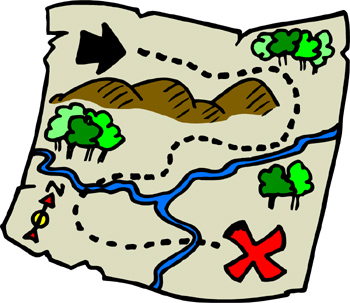 Treasure MapThe smartphone you already own likely has a GPS and if so, you can hunt treasure for free. There are thousands of hidden treasures around the Lake Tahoe area searchable by hiking or canoeing or offroading. These "geocaches" are stored in a database available to everyone. Your smartphone will guide you, just lace up your boots and bring your dog and kids. I'll give you the exact steps needed to get started in the healthy hobby of Geocaching.
Treasure MapThe smartphone you already own likely has a GPS and if so, you can hunt treasure for free. There are thousands of hidden treasures around the Lake Tahoe area searchable by hiking or canoeing or offroading. These "geocaches" are stored in a database available to everyone. Your smartphone will guide you, just lace up your boots and bring your dog and kids. I'll give you the exact steps needed to get started in the healthy hobby of Geocaching.
Step #1: Confirm you have a car GPS or a smartphone with a GPS receiver. iPhones and most Android phones qualify.
Step #2: Sign up for a free database access account and read more about it on the geocaching.com home page.
Step #3: Download the "c:geo" app for Android or GeoCaching Intro for iPhone/iPad. These are free apps. Buy an app only after you get serious.
Step #4: Store the user ID you received in step #1 into your geocaching app. This allows the app to access the database and gives you an online log of the caches you found.
Next, I'll give you an example of a real treasure hunt done recently, with screenshots of what it looks like.
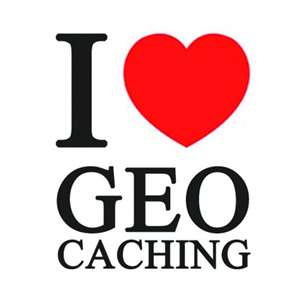 I heart geocachingFiring up the GPS receiver and geocaching app in my Android Nexus 4 phone, I launched off the back deck to discover hidden treasure nearby. What follows are my screenshots and impressions of a typical geocaching search.
I heart geocachingFiring up the GPS receiver and geocaching app in my Android Nexus 4 phone, I launched off the back deck to discover hidden treasure nearby. What follows are my screenshots and impressions of a typical geocaching search.
Bringing up the moving map display in the C:Geo app showed my current location as a blue arrow, with all the nearby caches as green books inside orange circles. At the 1 kilometer scale, hundred of caches appeared. How could there be so many; astonishing! I scaled the map to 500 meters and saw dozens, then 100 meters and still saw four caches. Ok, I can handle four. Let's start with the nearest one....
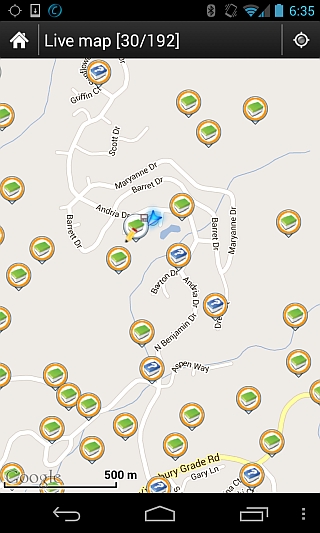 Big map of caches
Big map of caches
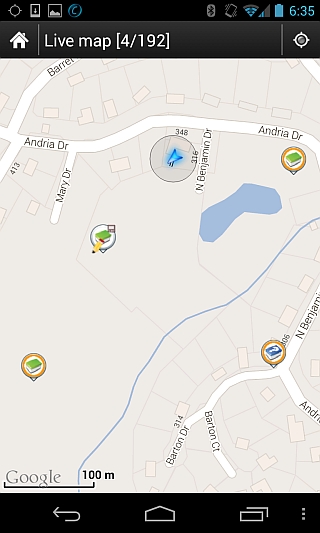 500 meter scaled map of caches
500 meter scaled map of caches
I walked down a path through the forest toward the nearest cache. As I looped around the trees, the map dynamically showed my trail, giving me feedback on where I was in relationship to the cache. On the 30 meter scale, I couldn't find the treasure, even when close to it. So I tapped on the icon for the cache to get more details and a hint on how to find it. Each cache has a name, set by the cache owner. This one is called "Wile E.", a clue to the treasure hidden there.
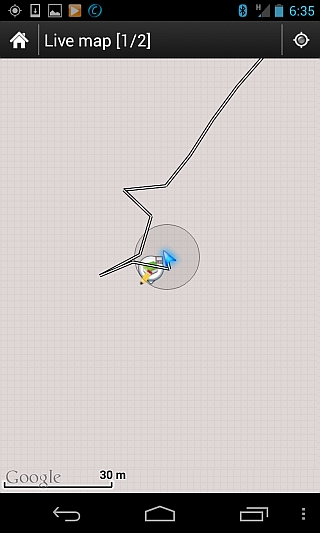 Wandering around the forest to find a cache
Wandering around the forest to find a cache
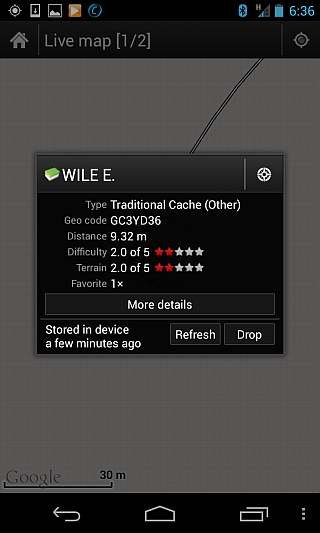 Tap on a cache icon in the map and get this brief database entry.
Tap on a cache icon in the map and get this brief database entry.
I clicked on "More Details", looking for a description of where the cache was hidden. It gave me some clues. Other people also left hints, stored after they found it themselves. My GPS got me close, within feet of the cache but I needed more help. The caches are kept hidden both as a challenge but also to prevent casual hikers from finding and possibly damaging them. Geocachers call this "muggling" a cache. Geocachers take care to preserve caches, it's their culture.
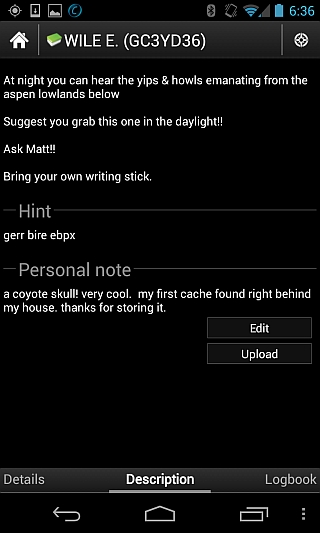 Hints to find cache Wile E.
Hints to find cache Wile E.
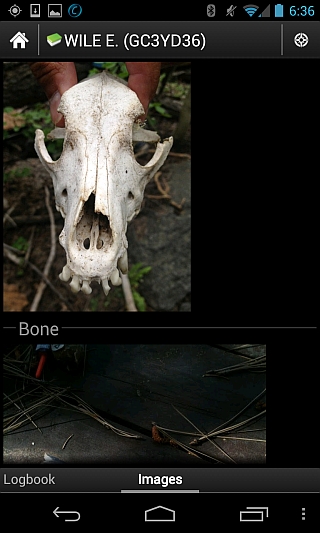 The hidden treasure is a coyote skull!
The hidden treasure is a coyote skull!
Bingo! I found the cache, a coyote skull. Also a plastic egg in a Ziploc bag where people can write their name as proof they found it. Or you can do as I did, leaving an online note in the central database. BTW, to expose the encrypted hint above, press the scrambled text and it will descramble.
This is a great way to spend the day in the forest with kids and dogs. Here's a link to more geocaching information.

